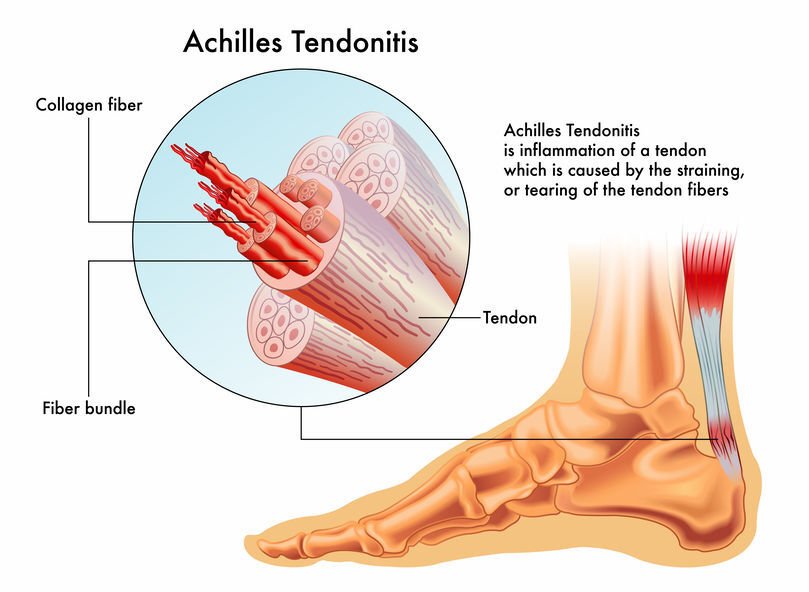Achilles Tendonitis/Tendinopathy

The Achilles tendon is found just behind and above your heel. It connects the bone of your heel with the muscles of your calf. Your Achilles tendon helps to bend your foot downward.
Achilles tendinitis/tendinopathy is a condition that causes this tendon, which joins your heel bone to your calf muscles, to have pain, swelling and stiffness.
Causes
The main cause of Achilles tendinopathy is believed to be repetitive tiny injuries or microtrauma. This causes Achilles tendon pain , swelling and stiffness. The tendon does not recover completely after each injury, as should usually happen. This means that damage to the Achilles tendon accumulates over time and Achilles tendinopathy can develop.
There are a variety of things that can lead to the Achilles tendon from these repetitive tiny injuries.
For instance:
• Achilles tendon overuse. For individuals who run regularly, this can be an issue. (people who play a lot of tennis or other sports involving jumping, Achilles tendinopathy may also be a problem.)
• Training or working out with inadequate footwear.
• Inadequate preparation for exercise-a poor running technique, for example.
• Changes in your normal training schedule-for example, sudden change in your training intensity and how much you exercise.
• Training on rough or sloped surfaces.
Achilles tendinopathy is also more prevalent in people who have such forms of arthritis, such as psoriatic arthritis or ankylosing spondylitis. It is also believed that for certain individuals who develop Achilles tendinopathy, the genetic ‘makeup’ (the material inherited by the parents that regulates different aspects of your body) may play a role. In individuals who have high blood pressure, high cholesterol or diabetes, it is often more common.
Around 6 in 100 inactive people will experience Achilles tendinopathy in their lifetime. In athletes or others who train regularly or do a lot of exercise, however, the risk of it developing is higher. For certain runners, it may be a specific issue.
Symptoms
• Pain and stiffness in the affected tendon
• This pain and stiffness is usually worse first thing in the morning.
• Pain on touching the Achilles tendon
• Pain on walking, and when running. This is generally worse after exercise.
Treatment
Typically conservative management of the condition is advised in the first instance.
Rest
If you have Achilles tendinopathy, rest and time off from sporting activities are necessary. All high-impact practises or sports (such as running) should be stopped first. As the pain reduces, you can resume exercise. It is assumed that full rest will potentially be worse for the injury if it is extended.
Painkillers
Painkillers can help to relieve pain, such as paracetamol or ibuprofen. Ibuprofen comes from a group of medicines called NSAIDs (non-steroidal anti-inflammatory drugs). However, if you have Achilles tendinopathy, you should not use ibuprofen or other NSAIDs for more than 7-14 days. This is because, in the long term, they can decrease the tendon’s capacity to heal. Please seek medical advice from your GP.
Ice
In the early stages of Achilles tendinopathy, ice therapy can be helpful for pain management and can help to decrease swelling. Speak with your healthcare professional for the correct advice.
Exercise
Research of specific exercises has been shown to help Achilles pain. These specific eccentric exercises help to both stretch and strengthen the tendon and assist the healing process.
Again, please speak to your specialist physiotherapist to find out exactly what you need to do.
Check out our top exercise for helping achilles tendinitis by clicking HERE.
Special sound waves travel through your skin to your Achilles tendon during this procedure. The strongest evidence for the effectiveness of Shockwave therapy is in the treatment of tendinopathies. Shockwave stimulates the natural healing processes and has a regenerative and tissue repairing effect. Pain will be released, motor function will increase and calcifications can be reduced.
Specialist insoles or orthotics can help improve your foot function. A specific heel raise may help to offload the actual tendon and reduce pain.
Steroid injection
For certain tendon injuries, injection of a steroid drug is a common treatment. However, for the treatment of Achilles tendinopathy, the use of steroid injections is controversial and is not approved in the UK. There is a chance of further weakening the tendon if steroids are injected directly into the Achilles tendon. There have been instances where tearing (rupture) of the tendon has been triggered. Injecting steroid around the Achilles tendon is another option. But again, in the UK, this is not approved.
If you have Achilles tendinopathy, there is a chance of tearing (rupturing) the Achilles tendon. This is because there is damage to the tendon and it is weaker than normal. This risk, however, is normally very low. A symptom of tendon rupture may be intense pain around the Achilles tendon that occurs abruptly. If you think you might have ruptured your Achilles tendon, see a doctor urgently.
There is also an increased risk that you could experience issues with the other over time if you have issues with one Achilles tendon.
None of the information in this post is a replacement for proper medical advice. Always see a medical professional for advice on your injury.
If you need any further information about Achilles pain then please call us on 028 92666959, or email info@gavnoble.com